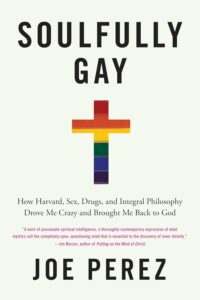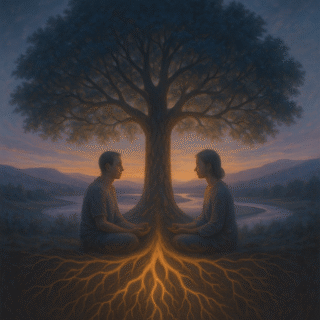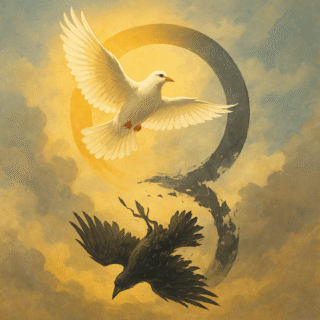THE IRONY WE ALL CARRY
The experience of being born homosexual in a world of heterosexual normativity and extensive homophobia is never one free of sadness. When same-sex love and desire become inescapable in teenage or adult years, homosexual feelings sometimes emerge into a gay, bisexual, or lesbian identity. At this stage in human development, gayness becomes the task of informing joy with sorrow, happiness with depth, and embracing a paradox that points to wholeness.
The Paradox of Being “Sadly Happy”
To be soulfully gay is, quite literally, to live in paradox. On the surface, if soulfully means “with deep feeling” (often associated with sadness or melancholy), and gay means “happy” (in its older usage), then soulfully gay might be read as deeply, even sadly, happy—a kind of joy touched by sorrow. It’s a form of bittersweet aliveness: the laughter that comes after grief, the smile that still remembers pain. It echoes a theme as old as spiritual art itself—that the deepest joy is often born of sorrow.
Rumi, the great Sufi poet, once said:
“Sorrow prepares you for joy. It violently sweeps everything out of your house, so that new joy can find space to enter.”
Gay people often know this truth not just as poetry, but as autobiography.

The Wound and the Insight
Our queerness is not just a social identity; for many of us, it is a spiritual initiation. We enter the inner life early—forced there by shame, silence, or fear. That early wound becomes the source of deep reflection, empathy, and often, creativity. Before we come out, we look inward. Before we dance, we ache.
This doesn’t mean every gay person is spiritually awake or mature. But it helps explain why so many gay writers, artists, and mystics describe their queerness as uniquely spiritual. Not because being gay is inherently holier—but because surviving gayness in a hostile world tends to cultivate inner resilience, emotional complexity, and a depth of self-awareness that many never need to develop.
Joy as Rebellion, Joy as Survival
And then there’s joy.
The gaiety in “gay” is not a shallow happiness. It is often a defiant celebration. Our festivals, parades, drag performances, and flamboyant expressions are not mere entertainment—they are survival rituals. Joy becomes sacred. It becomes our way of insisting that we are still here, still beautiful, still worthy of love.
But this joy is sometimes misunderstood—by our detractors and, at times, by ourselves. Critics see gay culture as frivolous or unserious. And some within the community, disconnected from their soulful depth, may chase only the ecstatic surface while avoiding the shadow it rests upon. When we lose sight of the paradox—when we forget that to be soulfully gay is to be both joyous and deep—we risk becoming caricatures of ourselves, rather than the whole, radiant beings we are meant to be.
The Gift of Complexity
We tend, on the whole, to be more complex people than we would have been had we been born straight. More complex, more mature perhaps—because we’ve had to navigate our identities in the face of resistance. We’ve learned to integrate opposites: longing and shame, ecstasy and heartbreak, visibility and vulnerability.
When you consider this fact, please be aware that the conversations I am initiating in this blog will sometimes be more complex than you might expect. Don’t resist the complexity—even if you need to set the ideas down for a while and come back to them later when you are in a more contemplative frame of mind. The fact is that to gain a fulsome understanding of LGBTQ+ spirituality, one must examine the world from a multitude of perspectives.
This complexity is not a burden to shed. It is a treasure to honor.
Toward Wholeness
To be soulfully gay is not to choose between sorrow and joy. It is to dwell in both, fully and freely. It is to claim our right to mourn and to dance, to retreat inward and to shine outward. It is to know, perhaps more deeply than most, that life is not an either/or—but a dazzling, aching both/and.
And this, too, is a gift—not just for ourselves, but for the world. Being soulfully gay in this manner is a profound part of our collective offering. We need to recognize it within ourselves, embody it, and then let our light shine forth, so we can give this gift to others. In our wholeness, we don’t just survive—we help the world remember what it means to be fully alive.





